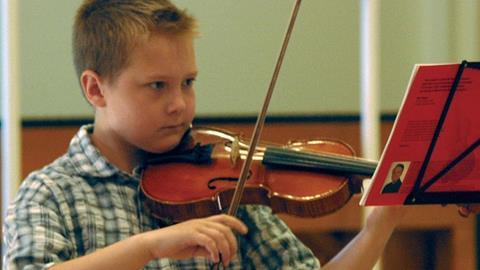For Royal Northern College of Music senior lecturer in education Philippa Bunting, there’s a delicate balance to be struck

I have a confession to make. I have a talented eight-year-old pupil who knows how to play the violin already. Every week she comes to her lesson, works hard, listens to what I have to say (to a greater or lesser extent), and every week she gets better. And although of course I’d love to take all the credit for her brilliance, I’m not sure I have anything whatsoever to do with it.
In my mind, I’ve travelled back in time to the antechamber of the Galleria dell’Accademia in Florence, watching as Michelangelo’s moving, vibrant prisoner statues seemingly claw their way out from their encasing blocks of Carrara marble. I suppose that to draw a direct parallel would be both to overstate the grandeur of my teaching studio and to exalt my status as artistic genius to an alarming extent. Nevertheless, the energising effect of the presence of a semi-carved musician-in-waiting caught in the act of releasing herself is just as exciting.
People tend to assume it’s easy to teach highly talented children. In my experience it is not. It’s many things – challenging, inspiring, exhilarating, surprising, uplifting – but not easy. There are a number of reasons for this. Chief among them is the fact that these pupils already know things they probably shouldn’t. This rare tribe doesn’t develop in nice straight lines – instead, students tend to leap disconcertingly from crag to crag like intrepid, and somewhat unpredictable, mountain goats. They also question just about everything. They don’t mean to be rude – they just really want to know. It matters.
Is it more of a responsibility teaching a talented child? I suppose in a way it is – the stakes are higher in that there is more chance of such students making their livelihood from music. Is it quantifiably different from working with any other child? On balance, I’d say no. Although my pupil plays very well for her age, she needs her confidence building like anyone else. She needs generous doses of praise, the knowledge that any mistakes she makes will be greeted with humour rather than despair, and that her own unique voice, among all those other voices, is important. She also needs to know she’s valued both with and without her violin in her hand. As we all know, being different is no light burden for a child.
But there is that doubt. We all know how highly competitive the professional arena is, so getting ahead of the game early might seem important. It is certainly a temptation. So here’s where hothousing enters the scene – calling children ‘talented’ simply by virtue of being ahead of that game. And hothousing comes in many forms and extremes, even pushing a pupil to a diploma at the age of seven.
But then, where are they racing to? Where is the finish line? Is music really all about playing more and more complex things more and more brilliantly? Faster? All our instincts as teachers tell us to go slowly, be thorough, bed in the basics, and make sure musical understanding is strong and reliable. We should not encourage hopeful guesses and uncomprehending imitation. But sometimes parents do want their child to learn as quickly as possible. And all the world loves a prodigy – just look at YouTube.
Picasso wrote: ‘Every child is an artist. The problem is how to remain an artist once we grow up.’ In turning our younger talents into mini-professionals, do we run the risk of strangling Michelangelo’s 'angel in the marble’ – that innate sense of self-expression? If we stifle it in childhood, it will surely be difficult to rekindle later in life.
Back to my pupil. She certainly isn’t hothoused and her parents don’t see the need to push her. She does lots of playing, exploring and improvising but, for the moment, only short bursts of concentrated practice. And here comes the key question: by giving her time to develop as a whole person and expressive musician, rather than latching on to and training her quick musical brain and fingers, are we in fact holding her back? It’s a delicate balance, but I honestly don’t think so.
Anyway, if the worst comes to the worst, she’s got her fallback plan worked out. In between bouncing on her trampoline, taking cars to pieces and the odd trip to a theme park, she’s going to get a job in her favourite department store. Apart from anything else, she likes the uniform.
Photo: Veikko Hiiri








































No comments yet